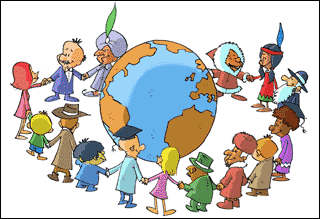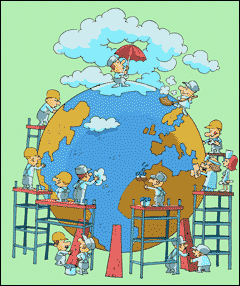
| Objective of the project | |||
| Why Soria? | |||
| Background | |||
| DEYNA technology | |||
| In action | |||
| DEYNA Foundation | |||
 |
|||

| BACKGROUND |
|
In the seventies, the scientific community began to warn of the problems faced by the planet. In 1972, the foundations of the Rio Summit were lain in the first world meeting on the Environment ("Conference on the Human Environment"), which was held in Stockholm with the participation of 113 countries. The conclusions of this conference were reported in the Brundtland Report, entitled Our Common Future, directed by Gro Harland Brundtland, ex Prime Minister of Norway. The UN established the World Commission on the Environment and Development in 1983. Four years later, in its historic report, it warned that humankind must change its ways of life and commerce if it does not wish to live a future era of unacceptable human suffering and ecological degradation. In 1989, the UN began planning the Conference on the Environment and Development, in which the principles for reaching a Sustainable Development would be drawn. For two years, numerous experts from all over the world threw themselves into the task of arranging agreements that would pave the way to Rio de Janeiro.
In Rio, June 1992, the First World Summit was held. Two international agreements were reached, two declarations of principles and a vast program of action about Sustainable World Development were formulated. One of these is the Program 21, a prototype and model of principles for achieving Sustainable Development from a social, economic and ecological point of view. In June 1997, the Second Earth Summit (Rio +5) was held in the UN headquarters in New York, to think over the little that had been done of what had been proposed in the first summit. DEYNA uses the term Sustained and Ecoevolutionary Development when referring to the territory where its General project is applied. The term Sustainable is perfectly adequate when used to describe the new model of development for the future. Both are solidary with future generations. Sustainable Development is that which is not only economic but also humanistic, generation spanning and in harmony with nature. It concerns the search for a solution of world-wide validity, complete and adequate for the characteristics of every space and population treated, which will be capable of solving the multiple and complex problems involved and at the same time, lead to a new awareness and respect to the environment and the way it is used (ecoethics). Sustained: A course already embarked upon. Sustainable: A possible course, contrary to the present model of development, which has not been embarked upon yet. A sustainable economy
is one that obeys the basic principles of the laws of sustainability.
These principles are as real as those of aerodynamics or thermodynamics.
When someone designs a plane, he must observe the principles of
aerodynamics, otherwise his plane will either not fly or crash down.
In the same way, a system of sustainable or supportable economy
must observe the principles of sustainability as well, otherwise
it will not last long. The basic laws or principles of sustainability
are as stubborn and inflexible as the laws or principles of aerodynamics.
A society might violate these rules for some short period of time
or in the short run, but not in the long term. A fishing ground
may be overexploited for a short time without, fatal harm, if it
is left alone long enough to get back in shape. If it is overexploited
endlessly, though, it will collapse and disappear. Just like a plane
can lose some height for a short period of time without crashing
down, an economy can violate the principles of sustainability for
a short time without suffering a collapse. The principles of sustainability are as simple as the following examples:
DEYNA thinks that by concentrating actions on just one province (Land, department or county) with a "standard entity at a world level," that is to say, in a significant, determined and limited territory (where for the most part environmental actions have been sporadic, scattered and unconnected) the result will be a very special territory, protected from deterioration, which will favour a positive opinion and massive favourable critics. Demonstrable effects will be achieved in a short term, as well as exemplariness. Interdependence is becoming increasingly higher among different countries, and the planet looks increasingly rather like a vehicle in which we all travel together through space. This interdependence has made it more likely that those who thought they were free from bounce effects will receive them, though. On account of which not only "solidarity and harmony" are to be called on in order to defend the common welfare, but also selfishness can be called on as an argument.
Pliny's idea (Pliny the Elder: De Natura) is that the factors which make up the Creation enrich and reinforce each other, and this becomes a very important idea in the world where we live today. New guidelines of behaviour are needed in children's education,for they will become the citizens of tomorrow. The science of ecoethics should be taught as something essential for mankind, because we have repeatedly disobeyed the advices of Aristotelian logic. The reason is that Nature does not forgive. She is implacable with whoever acts against her. Man has done so, is doing so, and will keep on doing so if his interests or his ethics do not move him. We hope that the argument of harmony will prevail, and that is why we undertake this project. It must be feasible, although it is ambitious, because it is necessary. The path towards sustainable development will smooth down as long as some concepts prevail in our minds: "usufruct" above "property," "equity" above "justice," and "friendship" above "respect." |
| Objective of the Proyect
| Why Soria? | Background
| DEYNA Technology In action | DEYNA Foundation | Local Agendas 21 Contact us | Home |

 Nevertheless
Nevertheless
